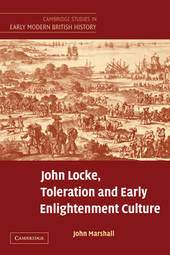
|
John Locke, Toleration and Early Enlightenment Culture
Paperback / softback
Main Details
| Title |
John Locke, Toleration and Early Enlightenment Culture
|
| Authors and Contributors |
By (author) John Marshall
|
| Series | Cambridge Studies in Early Modern British History |
|---|
| Physical Properties |
| Format:Paperback / softback | | Pages:776 | | Dimensions(mm): Height 229,Width 152 |
|
| ISBN/Barcode |
9780521129572
|
| Classifications | Dewey:940.232 |
|---|
| Audience | | Postgraduate, Research & Scholarly | |
|---|
| Illustrations |
Worked examples or Exercises
|
|
Publishing Details |
| Publisher |
Cambridge University Press
|
| Imprint |
Cambridge University Press
|
| Publication Date |
4 February 2010 |
| Publication Country |
United Kingdom
|
Description
This book is a major intellectual and cultural history of intolerance and toleration in early modern and early Enlightenment Europe. John Marshall offers an extensive study of late seventeenth-century practices of religious intolerance and toleration in England, Ireland, France, Piedmont and the Netherlands and the arguments that John Locke and his associates made in defence of 'universal religious toleration'. He analyses early modern and early Enlightenment discussions of toleration, debates over toleration for Jews and Muslims as well as for Christians, the limits of toleration for the intolerant, atheists, 'libertines' and 'sodomites', and the complex relationships between intolerance and resistance theories including Locke's own Treatises. This study is a significant contribution to the history of the 'republic of letters' of the 1680s and the development of early Enlightenment culture and is essential reading for scholars of early modern European history, religion, political science and philosophy.
Author Biography
John Marshall is Professor of History at The Johns Hopkins University. He is the author of John Locke: Resistance, Religion, and Responsibility (1994).
ReviewsReview of the hardback: 'A powerful piece of scholarship - brilliantly conceived, breath-taking in scope, and rich in historical insight - it will be of interest to a wide variety of scholars across a range of disciplines (history, religion, political science, philosophy, history of science, literature, and queer studies). ... a remarkable scholarly accomplishment. Marshall's book is surely destined to become a classic.' Catholic Historical Review Review of the hardback: 'This is a vast intellectual undertaking, in some measures, comparable to Quentin Skinner's Foundations (1978), which aspires to outline the historical relationship between the theory and practice of religious intolerance and tolerance in Europe after the reformation and before the Enlightenment. Like Skinner's great work, it is committed to a contextual method to explain and understand the thinking of the times.' Journal of British Studies Review of the hardback: '... this book is a tour de force. ... Marshall is to be congratulated on an important study that identifies and anatomizes the intellectual history of one of the most significant moments in early modern European history.' H-net.Albion Review of the hardback: 'Marshall's new text on the toleration debates should become a standard overview of the broad historical background of Locke's writing - both the toleration debates and the rise of the republic of letters.' Eighteenth Century Studies Review of the hardback: '... in his magisterial tome ... Marshall undertakes the massive task of describing the intellectual, religious, political, and cultural contexts in which discourses concerning toleration developed in early modern Europe. ... Marshall has written an important and monumental work. Using works by Quentin Skinner, J. G. A. Pocock, and Jonathan Israel as historiographical models, Marshall seeks to provide, in appropriately Baroque detail, the full weight of arguments for and against toleration from the period of the Reformation to the late seventeenth century.' Sixteenth Century Journal Review of the hardback: '... an outstanding contribution to the history of religious toleration ... offers the most comprehensive treatment of the subject in the late seventeenth and early eighteenth centuries, the early years of the Enlightenment, that now exists.' Church History Review of the hardback: ' ... detailed, judicious and rewarding. Any intellectual historian concerned with the social and intellectual framework of toleration in the period, or with the early Enlightenment more broadly, is well served by this magisterial treatment ... Marshall's scholarship is tremendous ... Marshall's book opens new and valuable windows on the Early Enlightenment ... the work is an immense contribution to Lockean and late seventeenth-century scholarship. ... suberb.' History of Political Thought
|